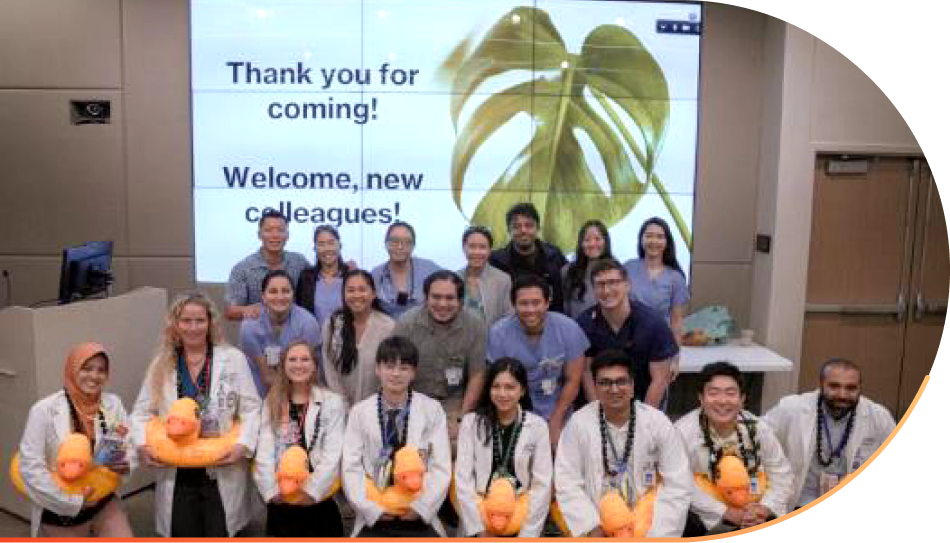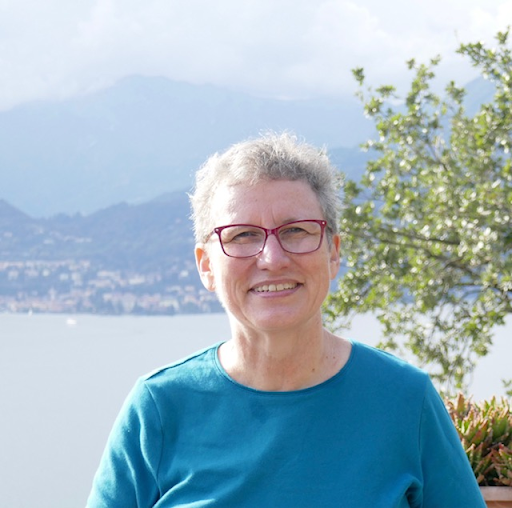Curriculum
Pediatric Level One Year
During the PGY-1 of pediatric training, emphasis is placed on a foundation of general pediatric medicine and the diagnosis and management of patients admitted to the hospital. Roughly 70% of the patients are supervised by a University of Hawaii Hospitalist. The other 30% are supervised by community attending physicians. Residents are also introduced to the management of common adolescent, behavioral-developmental and general pediatric problems encountered in the outpatient setting. PGY-1 residents are provided with numerous patient care situations under the supervision of upper-level residents and faculty, and they are responsible for the day-to-day management and order writing on all patients.
Pediatric Level Two Year
PGY-2 of pediatric training expands diagnosis and patient management skills through subspecialty rotations, supervisory experience and directing care on the general inpatient wards, and in the NICU. Residents also provide direct patient care in the pediatric emergency medicine and PICU. Residents also begin to see more acute care patients in the outpatient setting. During calls nights on the wards, upper-level residents answer calls for the clinic patients as well.
Pediatric Level Three Year
PGY-3 of pediatric training provides an opportunity for residents to refine their skills in diagnosis and patient management and emphasizes the supervision and teaching of PGY-2 residents. PGY-3 pediatric residents also serve as supervisors for PGY-1 and newborn nursery patients.
Individualized Educational Units
Individualized Educational Units (IEU) allow you to tailor your residency experience to align with your interests and educational needs. With guidance and support from faculty advisors and program administration, residents customize their own rotations. These rotations are normally 2-4 weeks long and can include a variety of experiences, including:
- Global or Rural Health – Rotations in American Samoa and on neighbor islands
- OR Bundle – Practice and refine procedure skills, such as LMAs, intubations and PIV placement.
- Labor & Delivery – Attend deliveries, assist with NICU admissions and procedures, and cover the nursery overnight.
- Private Practice – Work in a busy practice learning how to balance patient care, handle billing/coding, manage an office.
- Fellowship-Oriented and Away Rotations – Access to experiences that prepare residents for a specific fellowship are found locally, and residents are welcome to pursue away rotations on the continental U.S. to further explore fellowship options.
- Networking – All rotations offer the opportunity to build confidence when faced with increased autonomy and the challenge of working with limited resources. Whether in inpatient or outpatient settings, IEUs provide networking opportunities that may lead to fellowship or employment options following residency.
We continue to work within COVID related restrictions on travel to develop new, rural, and off-island rotations to expand our current IEU curriculum.
Neighbor Island Rotations (Big Island- Hilo, North Hawaii, and Kona; Kauai)
Duration: 2 – 4 weeks
Schedule:
- Completely up to you! Inpatient and outpatient opportunities exist at multiple locations and most residents choose to do a mix of both.
- Rotation can be used as an opportunity to explore the local area on your off days!
- The patient load is variable. As a part of the inpatient rotation you may interact with family medicine residents, round on nursery and wards patients, perform admissions and conduct pediatric consults in the ER.
GLOBAL/INTERNATIONAL HEALTH:
AMERICAN SAMOA
Duration: 2 weeks- 1 month
- You work in the pediatric outpatient clinic, nursery, wards, NICU and ICU.
- Call can be adjusted but recently has been every 3 days. When on call you do all the admissions, deliveries, and ER consults. After a call day, you have a free day to explore or relax!
- Admissions are carried out until discharge. On weekends, you round on and cover all pediatric patients in the hospital.
- Everything is based at Lyndon B. Johnson (LBJ) hospital. The ICU has two pediatric beds. The ward has 13 rooms.
- Your clinical skills are challenged in a setting of limited resources – for example, no MRI, no pulse ox in delivery rooms and limited access to ultrasound.
Global Health
Over the past few years, we have developed several 2–4-week rotations for our PGY3 residents at Lao Friends Hospital for Children in Luang Prabang, Laos and LBJ Tropical Medical Center in Pago Pago, American Samoa. Residents also can join Shriner’s physicians on their musculoskeletal medicine missions within the South Pacific (including Fiji, Tonga, American and Western Samoa, and the Marshall Islands). These experiences will give residents the opportunity to see and manage pathology not typically seen in the Hawaiian Islands or in North America. During these rotations, residents are given the opportunity to work as pre-attendings in inpatient and outpatient pediatric settings, providing care for patients in the newborn nursery and NICU, consulting in the ED, and admitting patients to their own service on the general pediatric floor or pediatric ICU.
We have also incorporated more Global Health material into our curriculum, including pre-departure preparation for rotating residents and an inter-departmental Academic Half Day devoted to Global Health topics for residents from the pediatric, family medicine, and psychiatry residency programs.
Educational Conferences
Resident Academic Half Day, CME Grand Rounds and Research Seminars
Academic Half Day is an integral part of the residency training and is protected educational time, free of clinical duties. Conferences and important resident events include:
- Morning Report
- General Pediatric and Subspecialty talks by our faculty.
- Journal Club and Morbidity & Mortality conferences given by residents.
- Board Prep: Board review sessions with residents of your class and an assigned attending.
- Program leadership updates on Graduate Medical Education (GME) or Program
- Resident Focus Group: Resident protected time to openly discuss resident concerns that are then brought to the Chief Residents for Program comment and/or action.
- Meetings with Hospital Leaders: Gidget Ruscetta, Kapiolani’s COO, meets with residents to provide general updates on the operations at Kapiolani and discuss Institutional Quality Improvement projects data.
- Meetings with Department Chair: Dr. Kenneth Nakamura to provide Department ongoing efforts and seek resident input.
- Radiology Rounds
- Grand Rounds
- Neuroradiology Rounds
- Sim Lab


















